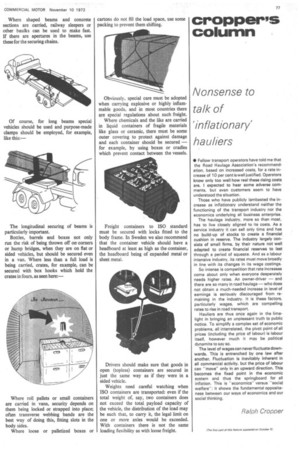cropper's column
Page 75

If you've noticed an error in this article please click here to report it so we can fix it.
Nonsense to talk of 'inflationary' hauliers
• Fellow transport operators have told me that the Road Haulage Association's recommendation, based on increased costs, for a rate increase of 10 per cent is well justified. Operators know only too well how real these rising costs are. I expected to hear some adverse comments, but even customers seem to have understood the situation.
Those who have publicly lambasted the increase as inflationary understand neither the functioning of the transport industry nor the economics underlying all business enterprise.
The haulage industry, more so than most, has to live closely aligned to its costs. As a service industry it can sell only time and has no build-up of stocks to create a financial cushion in reserve. The industry largely consists of small firms, by their nature not well adapted to create financial reserves to last through a period of squeeze. And as a labour intensive industry, its rates must move broadly in line with its changes in its wage costings.
So intense is competition that rate increases come about only when everyone desperately needs higher rates. An owner-driver — and there are so many in road haulage — who does not obtain a much-needed increase in level of earnings is seriously discouraged from remaining in the industry. It is these factors, particularly wages, which are compelling rates to rise in road transport.
Hauliers are thus once again in the limelight in bringing an unpleasant truth to public notice. To simplify a complex set of economic problems, all interrelated, the pivot point of all prices (including the price of labour) is labour itself, however much it may be political dynamite to say so.
The level of wages can neverfluctuate downwards. This is entrenched by one law after another. Fluctuation is inevitably inherent in all commercial activity, but the price of labour can "move" only in an upward direction. This becomes the fixed point in the economic system and thus the springboard for all inflation. This is "economics" versus "social welfare"; it shows the fundamental oppositeness between our ways of economics and our social thinking.
Ralph Cropper




































































































































